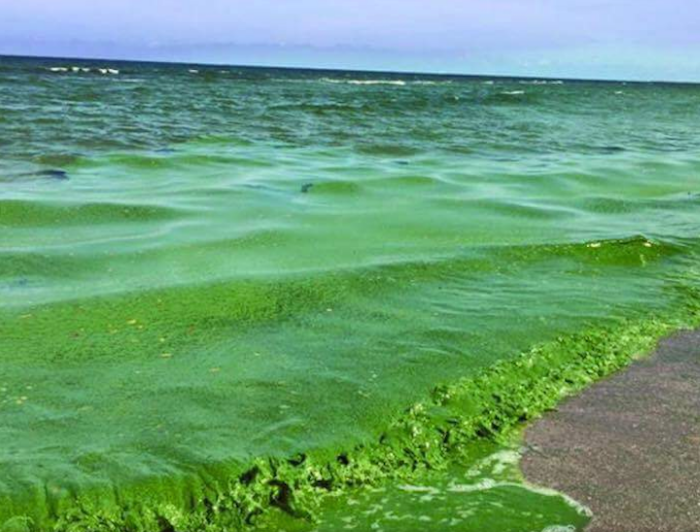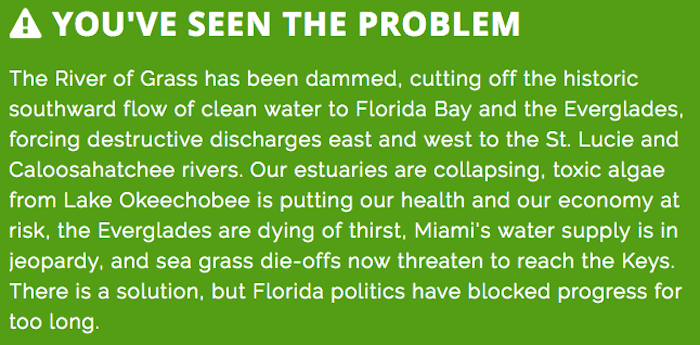
Environmental pollution is an incurable disease. It can only be prevented. — Barry Commoner
![]()
Why We Are Suing the Federal Government Over Our Water Crisis
By John Cassani, Calusa Waterkeeper / Bull Sugar / January 03, 2019
[dropcap]I[/dropcap]ntroducing federal legislation requiring our government to manage Lake Okeechobee in a way that doesn’t poison people is one way to protect our communities now.
Another way is suing the federal agencies responsible for the Lake Okeechobee Regulation Schedule (LORS). LORS is the policy that regularly authorizes toxic discharges, jeopardizes human health, and kills endangered wildlife by the ton. Calusa Waterkeeper, with the Center for Biodiversity and the Waterkeeper Alliance plans to sue to change this policy now–before there’s nothing left to protect.
More conservation groups are standing up for clean water, refusing to wait decades for Florida to build itself out of this water management crisis. It’s plainly the time for bold action cannot wait.” — John Cassini, Calusa Waterkeeper —
The popular expression “Nero fiddled while Rome burned” seems an appropriate metaphor for the water quality crisis afflicting Florida. Some suggest staying the course of state and federal Everglades restoration as currently planned.
However, there is significant uncertainty associated with restoration timelines, driven by such factors as climate change, available congressional and state funding, a swelling state population and worsening water quality. With current plans, these complexities will severely complicate or limit future options.

Cyanobateria sample, July 2018. Bullsugar supports this effort wholeheartedly, and we’re grateful for Cassani’s permission to reprint his column (below) announcing the upcoming suit. No one should have to wait 10 or 20 or 65 years for a solution. We need help now. (Published on 12/31/2018 by the Ft. Myers News-Press, available online here.)
Lake Okeechobee Regulation Schedule
More adaptive planning that explores a greater range of options in response to these stressors will be required and part of the reason the Lake Okeechobee Regulation Schedule (LORS), starting in 2008, was to only continue for three years.
The 2018 independent review of progress on Everglades restoration by the National Academies of Science, Engineering and Medicine indicated that at current funding levels, it could take 65 years to complete the presently authorized restoration projects. The same review also indicated it was time to consider the rate and influence of changing ecological conditions and to plan accordingly.
The potential for catastrophic consequences is disturbing
The growing realization that timely action is needed to avoid potentially catastrophic consequences is disturbing and becoming more evident each passing year. Symptoms of the water-quality — and water-quantity — crisis have never been more dire. Lake Okeechobee may be approaching a tipping point as the lake’s submersed vegetation has declined since 2006, evolving toward dominance by algae, ultimately sent downstream by Lake discharges.
The two worst blue-green algae blooms in state history have occurred over the past three years. A state of emergency was declared each time, earning national media attention
Three of the six longest documented red tide blooms over the last 65 years have occurred since 2002, and the current bloom — third longest in duration — is not over yet. The top four years with the highest manatee mortality since 1974 have occurred since 2010. Endangered sea turtle strandings along the Southwest Florida coast over the past year have exceeded 1,200. Of those, 577 were attributed to red tide, the highest number on record. At least 126 dolphins have stranded or died due to exposure to toxic red tide over the last six months.
The economic impacts of harmful algal blooms to public health, tourism and property value is staggering. Sanibel Island alone accounted for $26 million in costs for just 10 weeks of 2018’s harmful algal blooms.
Air sampling conducted for the cyanotoxin microcystin positive far south
The health costs, that we know of, are likely the tip of the iceberg. Testing results for the presence of the toxin microcystin in volunteer subjects in Stuart this past summer indicated 100 percent were positive. Even the air sampling conducted by FGCU for the cyanotoxin microcystin found positive results as far away as Bonita Springs.
Given the urgency of this crisis, a 60-day notice of intent to sue the federal agencies responsible for LORS was filed by the Center for Biodiversity, Calusa Waterkeeper and the Waterkeeper Alliance on Dec. 19 for violations of the Endangered Species Act.
The stakes have never been higher and the time for bold action cannot wait.
P.S. If you haven’t already, please become a Bullsugar member today and help make 2019 the year we take action to end Florida’s water crisis.




